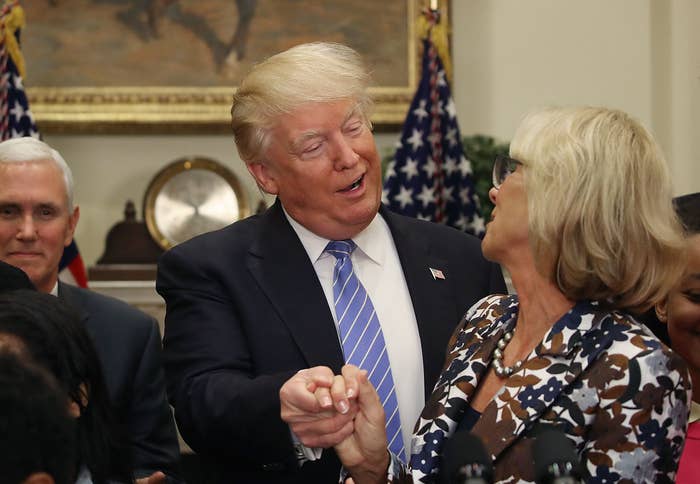
The Education Department is planning to suggest new rules that would make it far more difficult for borrowers to obtain student loan forgiveness after being defrauded by their colleges, according to drafts circulated by the department and obtained by BuzzFeed News.
The department's plan would require individual students to prove that their college intentionally deceived them — something that sparked alarm among student advocates, who argue it would push loan forgiveness out of reach for the vast majority of borrowers.
The proposal is part of the early stages of an effort by Education Secretary Betsy DeVos to rewrite the government's standards for loan forgiveness, called the "borrower defense" regulations. The proposed new rules would eventually erase regulations put in place by the Obama administration.
More than 80,000 claims for loan forgiveness are waiting for judgment by the department under the Obama-era rules. The vast majority were made by students at for-profit colleges, including tens of thousands who attended giant nationwide chains like Corinthian Colleges, ITT Tech, and the Art Institutes, which collapsed during the Obama administration.
DeVos has characterized the Obama-era version of the standards as a government handout to students — giving "free money" to anyone who "raised their hand" to claim they'd been defrauded. For-profit colleges and historically black schools, among others, said the rules made it much too easy for students to claim fraud.
Moves by the administration to raise the bar on loan forgiveness are "a good thing for American taxpayers," said Mary Clare Amselem, a policy analyst at the conservative Heritage Foundation, because taxpayers frequently shoulder the burden of providing forgiveness for federal loans when colleges have gone out of business. Obama's rules, Amselem said, "made it extraordinarily easy for any student to argue that because they didn't get the education they expected from their college, they were somehow defrauded."
At the core of the Trump administration's proposal, according to the drafts, is a requirement that each student provide "clear and convincing" evidence that their college "acted with intent to deceive," or a "reckless disregard for the truth" — a far higher bar than the one set by the Obama administration, which asked only for a "preponderance of evidence" that a student had been deceived, and required no proof of a school's intent.
"It's hard to picture how any student would be able to meet such a high bar," said Clare McCann, who works on higher education policy at the left-leaning New America foundation and helped write the Obama administration's original standards.
Students "don't have access to the information and internal documents you would need" to prove colleges intentionally deceived them, McCann argued. "It's setting the standard so that it's virtually unusable for everyone."
Amselem, of the right-leaning Heritage Foundation, said the Trump administration's suggestions appear "reasonable," rather than burdensome. "Requiring proof of intent is something we see elsewhere in our legal system," she said.
The new version proposed by DeVos's department appears to also slice away paths for forgiveness now available to students, like the ability to claim a college had breached its contract or use a court judgment obtained by another student, and would cut in half the time frame that borrowers have to file claims, from six years to three.
The proposals, which will soon be formally published by the department, are part of a lengthy process called "negotiated rulemaking" that is required of government agencies who are creating new regulations. They will be debated next week and could change significantly before being finalized.
